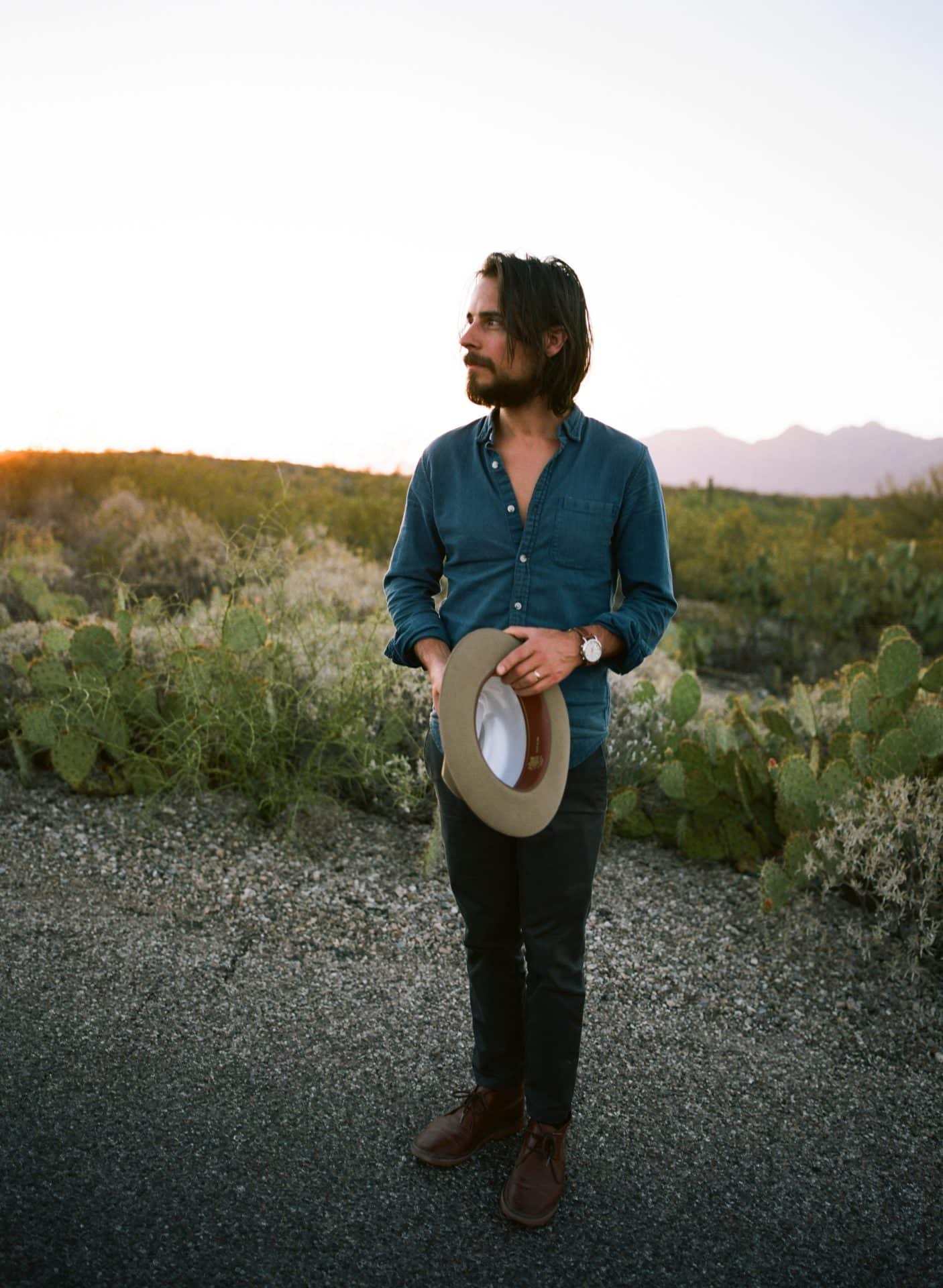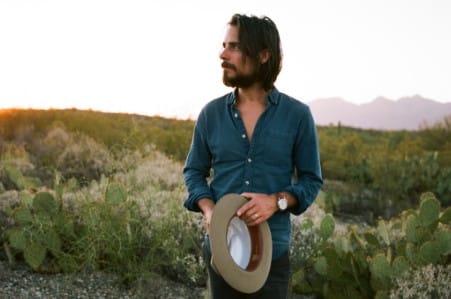
When Jonathon Linaberry wraps his hand around the neck of a resonator and kicks the skins, The Bones of J.R. Jones start to shake. There’s a primal aspect to the one-man-band philosophy, a lone wolf mysticism that mesmerizes and evokes rock n’ roll’s rowdy roots. For Linaberry, it’s all about discovery– and with a new EP drying on the line, he may have just found what he’s been looking for all along.
AI- How did you get into the one-man-band thing?
JL- I was living in upstate New York in a small town and going to school, and I didn’t really know anybody. And not knowing anybody, I kinda just picked up the guitar and… I’d been playing the guitar for years at that point but couldn’t find anybody to play drums, couldn’t find anybody to play bass with me, and kind of just decided to buy a kick drum one day. I decided to give it a crack and see what happened. It stuck, I guess! And so it’s, it’s just been that way since.
Did you have any blueprint in front of you on how to do it? Any method you were able to follow? I’m a big hillbilly, rockabilly guy and Hasil Adkins comes to mind…
Oh, man! It’s funny, I feel like once I started figuring it out, those– Hazel Adkins and, obviously, like Shakey Graves, and Suitcase Junket– all those guys kind of made their way into my world just by default the more I explored. Abner Jay? I don’t know if you’re familiar with Abner Jay? He was one of the first guys that came across. He was an old bluesman from Georgia, I think. I definitely learned a lot. Hasil Adkins is one of my favorites. He’s just tremendous. I love that guy.
When you started recording, was it predominantly doing what you do live in a studio setting?
No, no! That always has been a tricky question for me because I try to approach the studio as its own entity. Basically, fleshing out these songs to whatever degree I feel like they should be. So many times I go in there, either I will play drums separately or I’ll bring a drummer or an upright bass player or something like that just because as much as I love doing this one-man-band thing live, sometimes I feel like translating that energy from a live show to a CD is extremely hard without a full band behind you. I try to think of it as a different being altogether. There were some records that I did some one-man-band type stuff. I did a record a few years back called Dark Was The Yearling and that was predominantly done live as a one-man-band type thing. And then I added some bass stuff over it. But that was the only time I really took that approach.
You’ve had other folks join you in the recording process. Ones to Keep Close, your most recent album, certainly integrated other performers. It had a lot of different sounds compared to previous work. Was that a conscious shift or just the way it happened to turn out in those sessions?
It definitely was a conscious shift. My buddy Rob Niederpruem produced that record. We had worked together in the past and always talked about doing a record that was bigger and more all-encompassing. We really tried to develop the songs into something a little more unique– not more unique, but just different, not afraid of going to a different place that might make me uncomfortable at the end of the day. I’m glad we did it that way. A lot of the songs for sure have a different tonality to them. I think it was a lot of fun doing it… I don’t know if I would go that far again in some respect. I just finished recording a new EP and it’s much more contained. It’s not as like blues-rock type stuff but in terms of arrangements and instrumentation, it’s definitely much more in line with what I traditionally do.
So new EP,– you finished that? Who are the supporting characters within that and where did you record it?
We did it at a little spot in Brooklyn, New York called The Creamery, which is this old little studio, been there forever, and it’s great. The sound engineer there, this guy Jeff [Fettig], is an amazing sound engineer and he just got all the tones I was hoping for. So it was a lot of fun working with him. And then, predominantly, the other guy I worked with, who helped me arrange the songs once they were written, was my buddy Kiyoshi. When I play live, especially like in the Northeast, he’ll come out on the road with me from time to time and we’ll do like full band shows with him and a drummer or something like that. When Ones to Keep Close came out, I tried to do a few band shows and I was introduced to him. We just hit it off at that point and we’ve been working together since then.
Why an EP? I was always want to ask this ’cause it’s always strange to me sometimes when people choose to go the EP route versus the full album. And maybe it’s because they’ve got a section of songs that they want to share for another project. What’s behind the EP for you?
I totally get it. It’s a funny thing, especially in this day and age because everything’s so consumed digitally. Saying it’s an EP versus an LP, it’s a funny concept. But I chose EP, it’s six songs, primarily just because these songs definitely are of the… I’ve never done a concept album– and I wouldn’t qualify this as a concept album, but there’s definitely a theme to all these six songs and they live in the same world. A lot of these songs were written when I was spending some time out in the desert and they have a very kind of like Western folk-type sound to them. I don’t know if that was just part of the landscape I was living in at that point but for me, they definitely needed to be living together and as its own entity. That’s why I went to the route of an EP versus doing a full-length. Also, EPs generally are a little cheaper to make (laughs)!
When you were putting out and promoting Ones to Keep Close, I read several different interviews where you discussed how that album was really you dealing with certain insecurities around your evolution as an artist. Is that something that’s continuing for you, or are you finding where and what you want to be at this point?
I think it’s always changing, as simple as that sounds. As I said before, I feel like Ones to Keep Close was a great exercise for me to try to explore some more soul-inspired songs and more stripped back songs. And I would even venture that some of the songs went to more of like a pop rock-type, blues-type stuff. I’m so happy I did that, but I feel like just by exercising those muscles and seeing what it felt like, I have become more confident and more secure in what I wanted to do. Especially with this EP. I don’t think I’ve ever been so sure of the sounds on a record. It’s the first time I’ve recorded something in a long time where I was like, “This is exactly as it’s supposed to sound,” and it’s so cohesive and I wouldn’t change a thing.
You couldn’t say that about the last album. I saw where it wasn’t so much about changing something– but that’s a comforting statement to come from you, that it’s what you wanted it to be. That’s wild.
(Laughs) I guess just like everything, if you create something, it changes behind your back when you’re not looking at it. But I’ve been listening to it. I’m waiting on the last master to get back. The first five songs have been mastered and I’ve been listening to it nonstop for the last probably two or three months and my feeling about it hasn’t changed it, so I feel pretty good about it.
Without asking for a definitive date or trying to hold you to that, do you have a time frame for which you’re looking at getting it out?
Oh, man… I would love to get it out as soon as possible, but these things [have] so much more legwork behind it than I ever want there to be. I’m trying to be a little more patient with it this time around. I’ve always self-released everything and I’m hoping, my fingers are crossed, that there’s a record label out there, even like a smaller indie label that might want to help me distribute it and help me with a little PR push behind it. Because up until this point, everything I’ve done is just been self-released and kind of self-financed.
What’s it called?
A Celebration.
I saw on your tour schedule that you’ve got two nights coming up at the Mercury Lounge [New York] and one of those nights, you’re doing the full band thing. How often do you get around to doing that and who’s going to be with you on that particular show?
I’m hoping to make it more of a regular thing. Right now, it’s usually once or twice a year depending on the gig. Who’s going to be on stage is Kiyoshi, who’s always there to help me out, and then we have a fella named Bruno on drums and Caitlin [Gray] on the bass. Caitlin is a great bass player. She used to play with Hurray for the Riff Raff. I’m real excited about it– and then potentially there’ll be a singer or two along with that.
But it will be the Bones of J.R. Jones one-man-band show come March 4th on the Creek Stage?
Yes, sir! I can’t wait for it. I love Macon very much. It’s gonna be a lot of fun.
